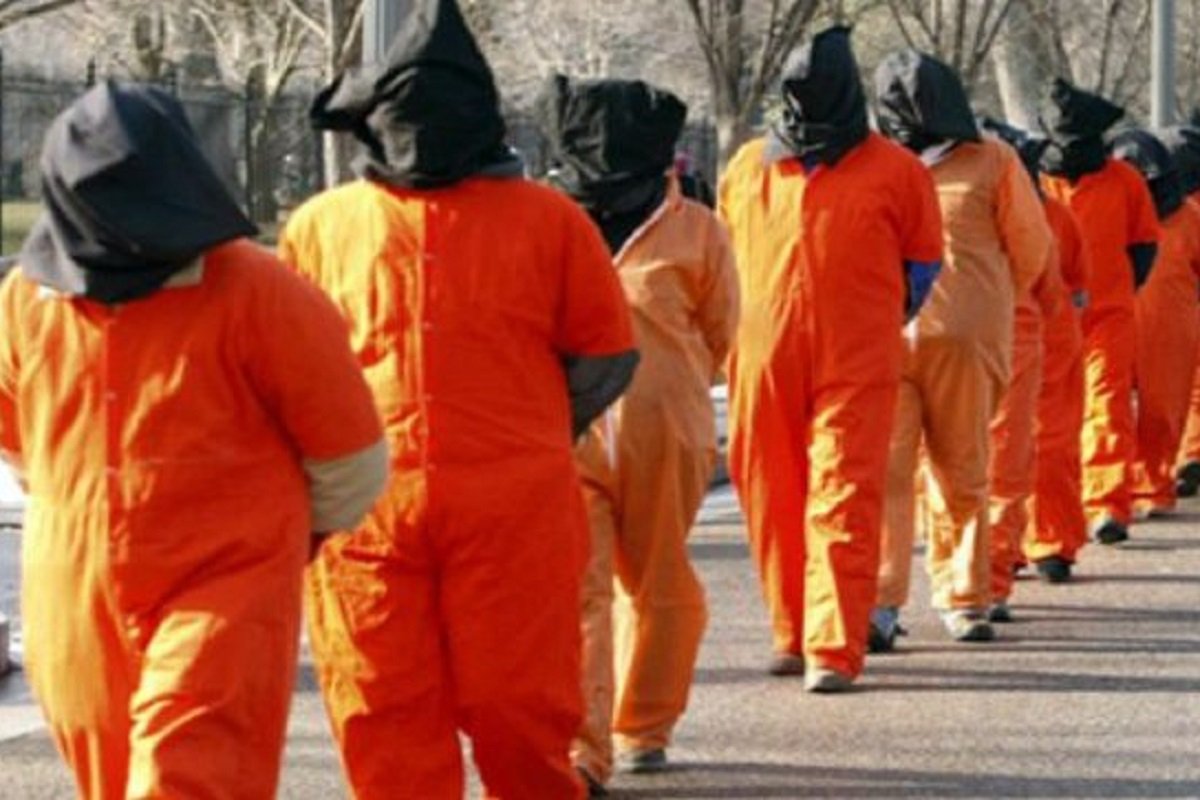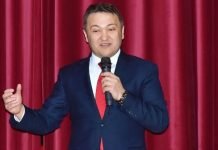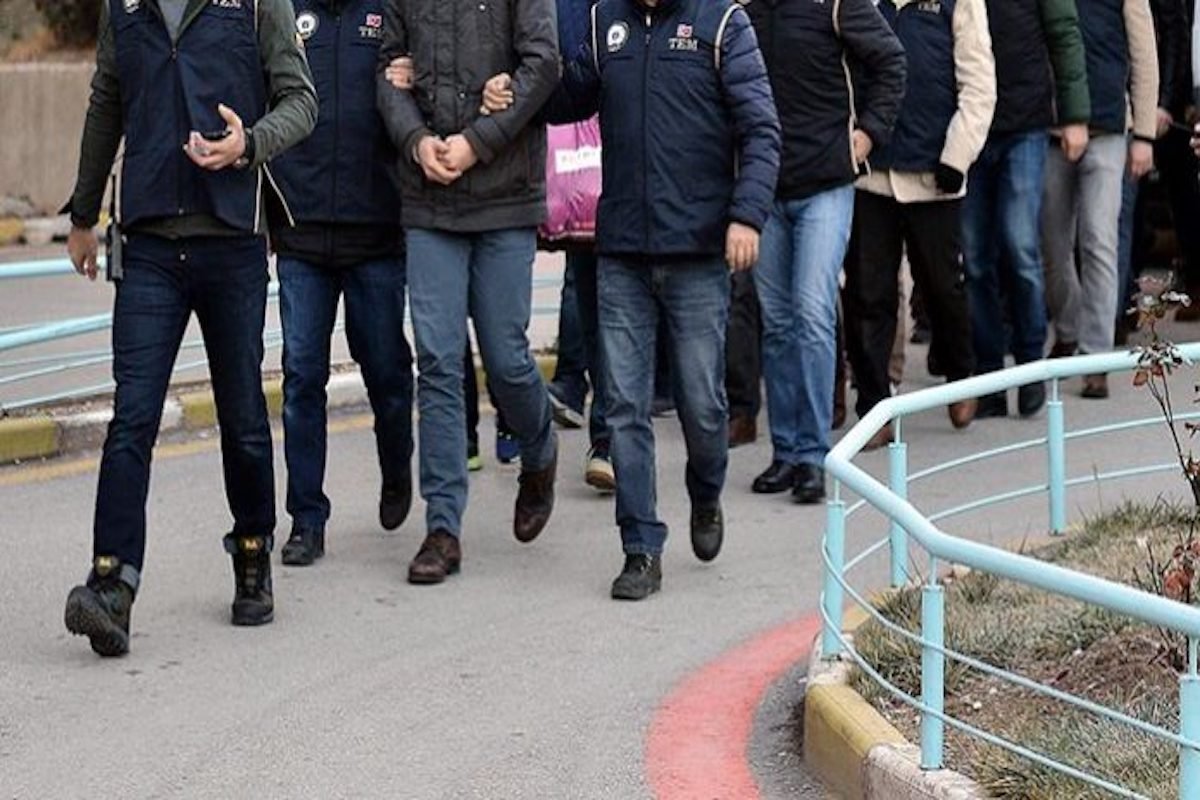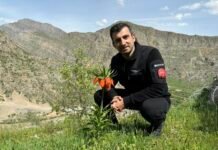Turkish government has issued a new post-coup executive decree (KHK) under the rule of emergency to oblige all suspects and convicts under arrest in prisons for alleged “crimes against the constitutional order” in Turkey to wear single-type uniforms, the Official Gazette said on Sunday.
According to the government decree No.696, the brown jumpsuits will be worn by those allegedly “attempting to abolish the order of the Turkish constitution by using force and violence, to replace the order with another one or to prevent the implementation of order” and allegedly “attempting to undermine the Turkish government by using force and violence or prevent it from performing its duty, partially or completely.”
The gray jumpsuits, meanwhile, will be worn by those who “attempt to undermine the Turkish Grand National Assembly or prevent it from performing its duty partially or completely,” “armed rebellion against the Turkish government,” “assassination of and assault on the president,” “crimes against the security of the state” and “crimes against the constitutional order.”
Pregnant prisoners and children will be exempt from such regulation while the rules for the female inmates in general will be decided later, according to the decree.
Turkish autocratic President Recep Tayyip Erdoğan on Sunday defended a state of emergency decree that stipulates all convicts and suspects under arrest for alleged crimes against the constitutional order in Turkey wear jumpsuits identifying their supposed crime, saying the US has implemented the practice in prisons, including Guantanamo, Evrensel reported.
Underlining that color-coded jumpsuits will be put on suspects only when they appear in court, Erdoğan said during a press conference at an İstanbul airport: “They will not be able to wear suits and neckties. They will put on identical jumpsuits and come to court.”
Claiming that this practice was a response to the demands of victims’ families, Erdoğan said: “This is not exclusive to Turkey. The US practices it. I can further say: They created a lifestyle with identical uniforms in Guantanamo.”
Erdoğan also claimed that Mehmet Hakan Atilla, an executive of Turkey’s state-owned Halkbank on trial for evading US sanctions on Iran, and Turkish-Iranian gold trader Reza Zarrab, who became a key witness in the trial after agreeing to a plea bargain with prosecutors, were taken to court in New York in handcuffs and with feet chained.
Erdoğan had said in mid-July 2017 that people detained over coup charges should wear a single outfit, like in Guantanamo. “When they appear in court, let’s make them appear in one-type uniform like in Guantanamo,” he said during an İstanbul rally to mark the first anniversary of the July 15, 2016 coup attempt.
Erdoğan’s proposal came only a week after one of the suspects on trial for an alleged assassination attempt against Erdoğan on the night of the failed coup was thrown out of the courtroom for wearing a T-shirt bearing the word “HERO” because it caused tension between the parties during the hearing. Any material bearing the word “HERO” has become suspicious leading to a series of detentions across Turkey. At least 42 people have been detained for wearing “HERO” T-shirts since last summer.
Turkey’s pro-Kurdish Peoples’ Democratic Party (HDP) parliamentary group deputy chairman Ahmet Yıldırım said on August 17, 2017 that the government made Gökhan Güçlü wear the hero T-shirt in order to impose identical uniforms on inmates.
A European Union spokesperson early September 2017 said reports of a government plan for suspects standing trial on coup charges in Turkey to wear identical uniforms were worrying. Underlining the significance of respect for the right to a fair trial and a commitment to a state of law, the EU spokesperson said: “The European Union has on many occasions stressed that any alleged wrongdoing or crime should be subject to due process and that the right of every individual to a fair trial needs to be respected, as well as the principle of the presumption of innocence.”
Former European Court of Human Rights (ECtHR) judge Rıza Türmen had said on August 2017 that obliging all suspects in ongoing trials concerning the failed coup to wear identical uniforms is against human rights and violates the right to a fair trial.
On Sunday, Turkish government has also purged a total of 2,766 people, including 105 academics, from state institutions in an accompanying decree, No. 695, increasing the total number of people who lost their jobs to 150,688.
A total of 637 military personnel, including 155 from the army, 155 from the navy and 327 from the air forces command have been dismissed, while 360 others have been dismissed from the gendarmerie. Moreover, 341 people from the Religious Affairs Directorate [Diyanet], 245 from the Justice Ministry, 61 from the police department were also dismissed.
The decree 695 also shuttered 7 associations, 7 foundations, 2 newspapers and a private company. 189 media outlets have been closed down since the summer of 2016.
GOVERNMENT EXTENDS IMMUNITY TO CIVILIANS FOR COUP AND TERROR CRIMES

The Art. 121 of Decree Law No. 696 also reads: “Regardless of their official duties, or appointments, any individuals who took part in suppressing the attempted coup d’état on July 15, 2016, terror acts, and other acts which are considered to be a continuation of these, will be subjected to the first clause [on immunity].”
An earlier decree law (No. 6755 ), later approved by the Turkish Parliament, provided immunity for state officials who took part in stopping the coup attempt.
Reactions to the new decree that gives immunity to civilian violence in the context of the coup attempt and terrorist attacks have begun to be voiced.
Kerem Altıparmak, a human rights lawyer from Ankara University, underlined in a tweet that with the new decree the worst human rights violations and all kinds of crimes have been legitimized under the cover of fighting terrorism. Recalling that the Turkish Constitutional Court has approved the government’s state of emergency decrees, Altıparmak called on victims and their relatives to go directly to European Court of Human Rights (ECtHR). Today’s clause provides ‘absolute impunity’ to civilians who killed or wounded others during the night of the coup, said Altıparmak.
Human rights advocate Ömer Faruk Gergerlioğlu summarized the new decree in a tweet: “If you make an innocent protest and someone kills you, he may not be punished. What else could be done to show that the state of law has ended?”
Turkey’s main opposition Republican People’s Party (CHP) deputy Sezgin Tanrıkulu tweeted that the new decree is a kind of message and guarantee to Gladio-JITEM-Hizbullah-like illegal armed structures for the future: “You commit a crime, and we’ll enact a law to save you.”
Tanrıkulu has also said that according to the new post-coup executive decree (KHK) there will be no legal, administrative, financial or criminal responsibility for civilians involved in the suppression of events. Tanrıkulu pointed out that this situation reassures paramilitary groups.
According to a report published by Artı Gerçek news portal, Tanrıkulu stated that such an arrangement could provide assurance to paramilitary organizations other than the security organizations authorized by law, for example, in the case of a resurgence of a period such as the Gezi Protests of 2013.
“Apart from the security forces authorized by law, this regulation paved the way for groups like the SADAT, the Ottoman Gang, the People’s Special Operation and other gangs which we know or do not know,” told Tanrıkulu by adding that they can make a legislation after giving instructions to repress such a protest like the Gezi.”
CHP Deputy Tanrıkulu also told that this decree of law is against the Constitution as it is contrary to the criminal law because a criminal offense cannot be excluded from the penal code.
Speaking of the previous examples, Tanrıkulu stated that the Constitutional Court abstained from examining such a Decree of Law. He said, “There is no domestic remedy for those who have suffered by the actions of civilians during the failed coup attempt. Directly appealing to the European Court of Human Rights is opened”, he said.
SADAT, which has also been called President Recep Tayyip Erdoğan’s “secret army”, was directed by retired Brig. Gen. Adnan Tanrıverdi, who was appointed as an adviser to President Erdoğan. Tanrıverdi is known for his Islamist ideology and has counseled Erdoğan for years although in an unofficial capacity, columnist Abdullah Bozkurt wrote for Turkish Minute on Nov. 25.
“Erdoğan regime has welcomed private participation in witch hunts against Erdogan enemies. Now pro-state vigilantism is formally legal,” tweeted Timur Kuran, a professor of economic and political development at Duke University.
Lawyer Hüseyin Ersoz noted the ‘continuation’ clause, and said, the laws cannot lift legal liabilities of a person before the act, “this is against rule of law.”
Turkey’s pro-Kurdish People’s Democratic Party (HDP) deputy Ziya Pir said: “The decree gives exemption from punishment for civilians. This move legitimises paramilitary groups in Turkey.”
Moreover, the top defense industry authority, The Defense Industry Undersecretary (SSM), has also been tied to the Turkish presidency with the new decree. SSM, which was established to develop a modern defense industry and to provide modernization of the Turkish Armed Forces (TSK), will carry out its works under the coordination of the Turkish Presidency. This authority had previously been tied to the defense ministry.
The undersecretary personnel will be appointed with the president’s approval and the president can transfer this authority to the undersecretary, according to the new decree. Contracted personnel may be employed for a project or contract that requires special knowledge, met with the fees paid by the fund. The upper limit of the salary the employees will receive will be determined by the Defense Industry Executive Committee. Funding scholarships and training support will be provided to develop human resources in the defense industry.
The Turkish president will chair the Defense Industry Executive Committee, which will be formed by the prime minister, the chief of general staff and the interior and national defense ministers. The prime minister will preside meetings the president cannot attend. The committee will meet upon invitation by the president. The SSM will run the committee’s secretariat services. The agenda for committee meetings will be determined by the president as well.
The committee will decide on the strategic goal plan for the TSK and for the production of modern weapons, equipment and tools for the Gendarmerie General Command, the Coast Guard Command and the General Directorate of Security, in accordance with the security priorities of the Interior Ministry, from domestic or foreign sources.
Turkey survived a controversial military coup attempt on July 15, 2016 that killed 249 people. Immediately after the putsch, the Justice and Development Party (AKP) government along with President Erdoğan pinned the blame on the Gülen movement.
Gülen, who inspired the movement, strongly denied having any role in the failed coup and called for an international investigation into it, but President Erdoğan — calling the coup attempt “a gift from God” — and the government initiated a widespread purge aimed at cleansing sympathizers of the movement from within state institutions, dehumanizing its popular figures and putting them in custody.
Turkey has suspended or dismissed more than 150,000 judges, teachers, police and civil servants since July 15. Turkey’s Interior Minister announced on December 12, 2017 that 55,665 people have been arrested. Previously, on December 13, 2017, The Justice Ministry announced that 169,013 people have been the subject of legal proceedings on coup charges since the failed coup.
















